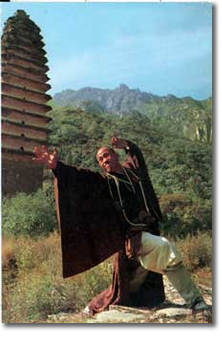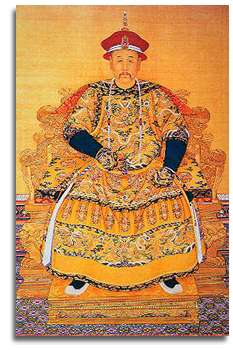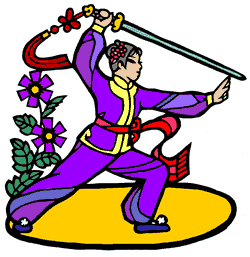The Shaolin Phoenix
The Founder of Bak Sil Lum and Hua Quan, Gan Fengchi
by Gene Ching
Crouching Tiger, Hidden Dragon did wonders for the Western kungfu movement. Now everyone is acknowledging this film genre that we have loved so dearly for so long. We all knew kungfu cinema was great cinema. It's so full of soul. Now, finally, the rest of the world is seeing it too. But of course we were there, before this new wave of interest, back in the day...

While Crouching Tiger, Hidden Dragon was new sensation for pop culture, we martial arts aficionados have seen this kind of film a hundred times before. It was a throwback to the old "old school" martial arts movies, pre-Shaw brothers, when romantic swashbucklers ruled the silver screen. These movies were called wuxia pian or "warrior-knight films." Wuxia pian were usually based on a popular genre of books known as wuxia xiaoshuo (warrior-knight novels.) Wuxia novels are the pulp fiction and comic books of Asia, packed with quixotic, inspiring legends about great martial arts masters with magic qi powers. Often, these fictional adventures were derived from folk legends about actual famous masters, just like our own tales of Robin Hood or King Arthur. In fact, the majority of period kungfu movies such as Wong Fei Hung, Hung Hay Kwun, Fong Sai Yuk and even Crouching Tiger, Hidden Dragon are based on classic wuxia stories. Despite their penchants for the absurdly fantastic, wuxia xiaoshuo preserves the spirit of the forefathers and foremothers of our cherished art of kungfu. And buried in those beloved novels remain countless legends about our martial ancestors yet to be translated.
One of the many wuxia xiaoshuo heroes so far unsung in English is Gan Fengchi. Gan is recognized in the martial circles as the founder of Bak Sil Lum (northern Shaolin) and Hua Quan (Flower Fist.) Additionally, Chinese readers know his posthumous martial treatise Introduction to Hua Quan. Gan was a great kungfu master and the embodiment of wude, the warrior's code. He was known by the title Jiangnan Diyixia - Jiangnan means south of the river, a reference to southern China and Diyixia means "number one knight." The stories of his adventures are full of the impossible, just like the flying and leaping in Crouching Tiger, Hidden Dragon, nevertheless his esteemed legacy remains to this day.
The Phoenix versus Plum Flowers and Bulls
Gan Fengchi was a native of Ningxian County in Jiangsu Province who lived under the reign of the 4th Qing Emperor Yongzheng (1723-1735 CE.) His given name Fengchi means "phoenix pond." Gan was born with a small, skinny body, not at all what one might expect of a legendary master, but he loved kungfu from the very start and trained assiduously all his life. Through his devotion, he eventually became the layman disciple of a Shaolin monk name Zhao Yuan. Zhao Yuan was originally from the royal family of the previous Ming Dynasty, whose secular name was Zhu Fu. When the Qing overthrew the Ming in 1644, Zhu Fu renounced his family name and became a monk, in hopes of learning Shaolin kungfu to help restore Ming reign. He trained Gan for twelve years.

Once, the Jin clan held a big party in honor of Master Gan. The Qing dynasty actually adopted the Chinese name Qing; they were really Manchurian, known as the Jin. As a show of respect, Master Gan sat at the highest seat of honor presented by the Jin head clansman. Everyone was drinking merrily when Master Gan noticed the beautiful flower garden outside on the Jin estate. Gan exclaimed, "Look outside! So many plum flowers are in bloom. We should appreciate their beauty but the window is closed." Without another word, Master Gan blew the window open, using only the qi of his breath. Everyone applauded with amazement. Noticing that the master was in a mood to demonstrate, another guest asked about Master Gan's legendary throwing skills. Gan obliged by instructing a maid to mark several of the plum flowers outside in the garden. He took a piece of napkin, crumpled it up into a tight wad, and flicked it from his seat. He hit every single mark dead on target.
Later, after they had finished drinking, the partygoers all decided to take a stroll about the Jin estate. While walking, some teenage shepherds approached them in desperate need of help. Two of their biggest bulls had been fighting all day nonstop. When the party approached, they found the bulls were struggling because they had locked their horns together. Master Gan effortlessly separated the mad bulls and tossed them aside. Both bulls fell into mud so deep that they couldn't get up. Everyone laughed with astonishment. Then Master Gan went down to rescue the hapless bulls.
Master Gan versus the Evil Emperor
 But still, a martial arts master seldom makes his reputation on flowers and bulls. Master Gan was best known for his opposition to the notorious Emperor Yongzheng. Later at that same Jin party was the first time they crossed paths. This was prior to Yongzhen usurping the throne. Before the party, a disciple of Gan named Bai Long Daoren (white dragon Taoist - a nickname) introduced the prince in disguise as Mr. Li. Bai Long told Master Gan that Mr. Li was his boss and had extended his invitation to Gan to return to the capital with him. The disciple praised Li for his generosity and his martial skill, but it was all just a ruse to get Gan to work as a fighter for the Qing. Master Gan agreed to meet Li for dinner at the party given by the Jin clan, which quickly became a test of each other's martial arts.
But still, a martial arts master seldom makes his reputation on flowers and bulls. Master Gan was best known for his opposition to the notorious Emperor Yongzheng. Later at that same Jin party was the first time they crossed paths. This was prior to Yongzhen usurping the throne. Before the party, a disciple of Gan named Bai Long Daoren (white dragon Taoist - a nickname) introduced the prince in disguise as Mr. Li. Bai Long told Master Gan that Mr. Li was his boss and had extended his invitation to Gan to return to the capital with him. The disciple praised Li for his generosity and his martial skill, but it was all just a ruse to get Gan to work as a fighter for the Qing. Master Gan agreed to meet Li for dinner at the party given by the Jin clan, which quickly became a test of each other's martial arts.
The prince, posing as Mr. Li, went first. He was a master of Shaolin gecko skills. Li placed his back to the wall, focused his qi, and then walked up the wall just like a gecko. Master Gan smiled, and took the same position against the wall. He told Li to hit him in the stomach as hard as he could. Li gathered all his strength and struck. Gan used his qigong skills to flatten out his belly so his body was a thin as paper. When Li punched, it was as like his fist collided with the wall behind Gan. Then Gan used his qi to suck Li's fist into his stomach so it was stuck as if it were glued there. Li was powerless to remove his fist. Gan laughed then loosened his stomach, releasing Li.
Later that night, Bai Long confided in Master Gan, revealing Mr. Li's true identity as the prince and his intentions to take the throne. He told Gan that Yinchen (Yongzhen's birth name before he became emperor) wanted Gan as one of his imperial guard, a very illustrious position indeed. Nevertheless, Gan refused. Bai Long begged, but Gan was adamant. Yinchen became very upset and grabbed Gan by the sleeve, but in one quick move, Gan turned and disappeared into thin air. Bai Long and Yinchen searched and searched. Finally, they found him hiding in a closet, using his qi power to stick high up on the wall. Neither Bai Long nor Yinchen could pull him down. Yinchen even used a Lama mantra to try and break the spell (the historical Yongzheng was in fact a devout Buddhist who converted the palace of his birth, Yonghe Gong, into a Lama Temple.) Yinchen was amazed by Gan's power, but he feared that Gan would join forces with the rightful heir to the throne, not him. So rather than lose Gan to his adversary, he drew his gun and shot him, then immediately fled back to Beijing with Bai Long. Guns were already dominant in China during Master Gan's time.
The other party guests heard the gunshot and rushed out. Gan emerged from another room, unscathed and laughing. Somehow, the bullet had not injured him; it just blew him into the next room unharmed. The Jin head clansman asked Master Gan why he didn't accept the prince's offer in the first place. Gan replied, "The fourth prince has the look of the emperor. But still, his chin bone sticks out too much, which means he is very selfish, so I do not want to follow him."
Master Gan versus the Begging Bowl Monk
Gan Fengchi went to live in Nanjing and his reputation for wude and kungfu assured that no one dared make trouble there for some time. But eventually a challenger did come, a monk with a giant begging bowl. The bowl weighed several hundred pounds when filled with offerings and the mischievous monk would use it to block doorways and paths. If someone wanted to get by, they either had to pay the monk toll or move the bowl, but of course, no ordinary person could even budge it. The harassed citizens of Nanjing were powerless to challenge the monk, so they threatened him by saying Master Gan would take care of him. But the monk was undaunted. Gan did not appear, so he ridiculed Gan and publicly challenged him.
As fate would have it, Master Gan had fallen very ill and was in no shape to face the monk. Furthermore, when people told him of the challenge, Gan knew immediately this was no ordinary monk. To carry such a huge begging bowl, this monk must be immensely powerful. He must have come looking for Gan with the intention of challenging him. Master Gan continued to avoid the monk so the monk's challenges grew in their offensiveness, but Master Gan was still sick.
 Then one day, Master Gan sought refuge at a nearby temple to meditate on how to deal with this monk. There the monk appeared, smiling at Master Gan. He said he wanted to present Master Gan with his begging bowl, then immediately lobbed the massive bowl at him. The bowl was filled with sharp coins, but Gan deflected everything with his wide sleeves. Master Gan retaliated by picking up a stone and chucking it at the monk, but due to his illness, his hand failed and he missed completely. Undaunted, Gan got another stone and said, "Since I missed your head, I'll hit your leg." The monk focused on defending his legs, but it was a feint. Gan threw the second stone with all his might at directly at the monk's baldhead. The second stone flew true, cracking the monk deeply on the skull. But the monk was unfazed. Master Gan was shocked. Such a blow would have killed most warriors. This monk's skill was superior then that of Master Gan. Gan humbly bowed down and begged forgiveness. The monk said, "You are uncommon and you favor me. I should return your stone, but I would like to bring it back to present to Zhao Yuan." The monk vanished immediately. Master Gan was worried when he heard his Shaolin Monk master's name, believing he had offended the monk with his trick, but he never heard from him again. Perhaps it was some sort of quality check, to make sure the Shaolin disciple had kept his skills up, but Gan never found out.
Then one day, Master Gan sought refuge at a nearby temple to meditate on how to deal with this monk. There the monk appeared, smiling at Master Gan. He said he wanted to present Master Gan with his begging bowl, then immediately lobbed the massive bowl at him. The bowl was filled with sharp coins, but Gan deflected everything with his wide sleeves. Master Gan retaliated by picking up a stone and chucking it at the monk, but due to his illness, his hand failed and he missed completely. Undaunted, Gan got another stone and said, "Since I missed your head, I'll hit your leg." The monk focused on defending his legs, but it was a feint. Gan threw the second stone with all his might at directly at the monk's baldhead. The second stone flew true, cracking the monk deeply on the skull. But the monk was unfazed. Master Gan was shocked. Such a blow would have killed most warriors. This monk's skill was superior then that of Master Gan. Gan humbly bowed down and begged forgiveness. The monk said, "You are uncommon and you favor me. I should return your stone, but I would like to bring it back to present to Zhao Yuan." The monk vanished immediately. Master Gan was worried when he heard his Shaolin Monk master's name, believing he had offended the monk with his trick, but he never heard from him again. Perhaps it was some sort of quality check, to make sure the Shaolin disciple had kept his skills up, but Gan never found out.
Master Gan versus the Evil Emperor - the Sequel
Emperor Yongzheng summoned Master Gan soon after he took the throne. Yongzheng still wanted to enlist Gan as a bodyguard and Master Gan could not refuse an imperial invite. Besides, he thought he could learn something about the inner circle of the palace for the Ming resistance. So he went, but he found the palace too well guarded for him to look around. The emperor looked at Gan's slight build with contempt and asked, "What skill do you have?" Master Gan said, "Your subject can be a light as a sparrow or as heavy as a stone." Yongzheng ordered Gan to demonstrate. Master Gan focused his qi and then leaped up to perch on a flower bush. Yongzheng was delighted and exclaimed, "How light he is!" Before the words left his lips, Gan jumped down and his legs sank into the tiled floor up to his knees. "Supernatural!" cheered the emperor and he immediately ordered that Master Gan be rewarded. Gan quickly found an excuse then escaped the palace.
Emperor Yongzheng never let go of Master Gan after that. In 1729, the seventh year of his reign, Yongzheng had Master Gan arrested by Qing officials. More than 100 others, many of who were also martial arts masters, were taken into custody in connection to a secret anti-Qing religious sect, led by the Monk Yi Nian. Like many such secret societies of China's turbulent history, Monk Yi Nian's followers espoused a doctrine of mysticism and martial arts with an undertone of rebellion. Such movements have always threatened the governments of China, so they are crushed quickly and mercilessly, even to this day.
The Emperor versus the Girl from Shaolin
 According to the wuxia xiaoshou, it was another Shaolin disciple, a teenage girl named Lu Siniang, who assassinated Yongzheng. As common plot device in wuxia stories, young swordswomen are often the most lethal, just like Jen in Crouching Tiger, Hidden Dragon. Lu Siniang and Gan Fengchi were both outstanding wuxia heroes of that era. Lu's father, Lu Liuliang was a great scholar from Shimen County in Zhejiang Province. He was sentenced to death for criticizing the Qing in his writings. When Yongzheng became Emperor, he further humiliated Lu. He had his body dug up, flogged and destroyed, as well as the entire surviving family killed. Lu Siniang escaped by fleeing to Shaolin Temple. There she became the disciple of a one-armed Shaolin nun named Guang Ci. Guang Ci was actually a Ming princess Chongping, daughter of the last Emperor of the Ming dynasty, Chongzhen (1628-1644.) Like Gan's master, Zhao Yuan, Guang Ci took refuge at Shaolin in hopes to learn kungfu and restore her fallen dynasty. There are two legends about how she lost her arm. The first is that she lost it to Yongzheng in a previous battle. The second is that she lost it to her father, the Emperor. According to the actual history, when the Qing troops began storming the palace, the emperor got drunk. He ran through the palace ordering all the women to kill themselves. While the Empress Zhou did just that, the Emperor killed his concubines and another daughter. In his madness, the Emperor also cut off the arm of one of his daughters before hanging himself on a locust tree. However, whether or not that daughter survived to go to Shaolin remains a mystery.
According to the wuxia xiaoshou, it was another Shaolin disciple, a teenage girl named Lu Siniang, who assassinated Yongzheng. As common plot device in wuxia stories, young swordswomen are often the most lethal, just like Jen in Crouching Tiger, Hidden Dragon. Lu Siniang and Gan Fengchi were both outstanding wuxia heroes of that era. Lu's father, Lu Liuliang was a great scholar from Shimen County in Zhejiang Province. He was sentenced to death for criticizing the Qing in his writings. When Yongzheng became Emperor, he further humiliated Lu. He had his body dug up, flogged and destroyed, as well as the entire surviving family killed. Lu Siniang escaped by fleeing to Shaolin Temple. There she became the disciple of a one-armed Shaolin nun named Guang Ci. Guang Ci was actually a Ming princess Chongping, daughter of the last Emperor of the Ming dynasty, Chongzhen (1628-1644.) Like Gan's master, Zhao Yuan, Guang Ci took refuge at Shaolin in hopes to learn kungfu and restore her fallen dynasty. There are two legends about how she lost her arm. The first is that she lost it to Yongzheng in a previous battle. The second is that she lost it to her father, the Emperor. According to the actual history, when the Qing troops began storming the palace, the emperor got drunk. He ran through the palace ordering all the women to kill themselves. While the Empress Zhou did just that, the Emperor killed his concubines and another daughter. In his madness, the Emperor also cut off the arm of one of his daughters before hanging himself on a locust tree. However, whether or not that daughter survived to go to Shaolin remains a mystery.
Guang Ci poured all of her skill into Lu Liuliang. When she was ready, Lu snuck into the palace at night for a swordfight with Yongzheng, one-to-one, girl-to-emperor. Yongzheng was a highly skilled martial artist himself, but he was caught off guard by this beautiful young sword-wielding girl in his bed chamber. Lu took advantage and kicked his sword from his hand. The emperor scrambled to his bed to retrieve his pillow sword, but Lu was fast enough to catch him. She cut his head off with one blow, and then escaped to tell her master she was avenged.
Wuxia Xiaoshou versus Real Kungfu
In our paranoid age of school shootings, hate crimes and terrorist attacks, the ancient fighting systems of kungfu appear arcane for self-defense, so 'reality' is a big issue. In the face of such harsh realities, wuxia tales like Crouching Tiger, Hidden Dragon become appealing escapist fantasies. But in the martial arts, our western 'scientific' perspective can reduce kungfu down to only what works in street combat and defines that as 'real.' All of the rest is disregarded as fake. Such a myopic viewpoint might deride the fantasy fights in Crouching Tiger, Hidden Dragon or read wuxia tales, saying it's not real kungfu because it fails to meet their expectations for a real fight. But if everything is kept in the context of being a story, the issue of reality is absurd. Of course it's not a real fight, it's a story. Expecting reality in such a story is a little silly. With the current trend of movie choreography towards more wire work, martial 'realists' should step back and look at the bigger picture. Was Yongzheng really assassinated by a teenage Shaolin disciple girl? Probably not, but it sure makes a great story. And within that story is something even greater.
Beyond snubbing entertainment, the real-versus-fake dichotomy has a much greater cost. Exclusive focus on fighting techniques is quite literally amoral. Such scientific reductionalism sacrifices the most valuable lesson of kungfu - wude, the warrior's code. Unlike the Japanese warrior's code of Bushido, kungfu wude cannot be found in written an ancient etiquette treatise. Much of wude is unspoken, but you know it when you see it. It is buried in our legends and folk tales. It is demonstrated by examples in our books and movies, albeit in fantastic examples. It is what wuxia is all about. And wuxia speaks to everyone, martial artist and non-martial artist, about the values and ethics of the warrior way.
The real quest of the warrior is not to learn how to fight, it's to discover when to fight and why. While these stories might not provide the best technique to kick someone's butt, there are far more meaningful lessons in kungfu. We preserve the legacy of masters like Gan Fengchi when we practice Bak Sil Lum or Hua Quan. We also honor them whenever we retell their stories. And just like the kungfu he created, the wuxia tales of Master Gan have valuable lessons that deepen in meaning with every recitation.